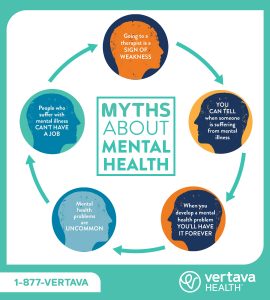Mental health is a hot topic, but sometimes for all the wrong reasons. While more and more people are speaking up about mental health and mental illness, there is a lot of misinformation on the subject that is often doing more harm than people realize.
The Truth About Mental Health & Mental Illness
Misconceptions about mental health may not be shared with poor intentions, but in some cases, their spread can be both hurtful and harmful. Not only can this misinformation enforce negative stereotypes, but also some myths associated with mental illness may keep people who need mental health services from seeking help. It’s time to learn the facts about mental health and become an advocate for the truth. At Vertava Health, we are here to help you debunk the biggest mental health myths.
1. MYTH: Going to a therapist is a sign of weakness.
Admitting you need help and seeking it out is often one of the hardest things for people with a mental health condition to do and takes a lot of strength. Too many people let their fears and the stigma surrounding mental illness keep them from getting the help they need. Going to a therapist not only takes courage but will also make you stronger than you will be if you continue to struggle on your own.
2. MYTH: People who suffer from mental illness can’t have a job.
Another common misconception about mental illness is that it prevents people from being productive and functioning members of society with careers, families, and aspirations. In reality, mental illness falls on a wide spectrum and some conditions are more disruptive than others. There are plenty of people with mental health conditions who are able to lead mostly normal lives.
3. MYTH: You can tell when someone is suffering from mental illness.
Just like some people believe that those with mental health problems can’t function in society, many also believe that mental illness is easy to spot. In actuality, a lot of people with mental health conditions appear fine from the outside. Some of this may be because they have a milder condition, but many people will also hide their symptoms out of fear or embarrassment.
4. MYTH: Mental health problems are uncommon.
If you are struggling with a mental health condition it is normal to feel alone or that no one knows what you are going through, but this is a common misunderstanding about mental illness. Over 51 million or 1 in 5 adults in the United States experiences mental illness each year.1
5. MYTH: When you develop a mental health problem, you’ll have it forever.
While some people may have more chronic conditions that shift between periods of heavy symptoms and “normal” living, others may have symptoms and conditions that are more short-lived. Without help, some mental health problems will get worse, but with psychotherapy, medications, and other treatments, many people will learn how to manger their symptoms and make a great stride in recovery.  Mental health is different for everyone, and mental illness is often much more complex and varied than people realize. It is important to know the facts and speak up against mental health myths and misconceptions. If you or someone you care about is struggling with a mental health condition, stop waiting to get help. With onsite and virtual mental health treatment options, we make getting care easy. Contact us today to learn more.
Mental health is different for everyone, and mental illness is often much more complex and varied than people realize. It is important to know the facts and speak up against mental health myths and misconceptions. If you or someone you care about is struggling with a mental health condition, stop waiting to get help. With onsite and virtual mental health treatment options, we make getting care easy. Contact us today to learn more.


